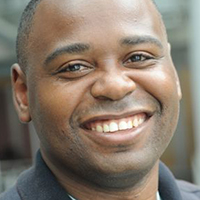When I think of Dr. King, I can’t help but think of his capacity for love in the sense of agape: “Love men not because you like them but because God loves them.” I’ve wondered whether Dr. King ever thought of himself as a hero or of what he was doing as a leader for civil rights, human rights, and economic rights as particularly heroic. If asked directly, he likely would have answered no. But his acts were heroic: demanding that justice and equality be honored in a nation that claimed to sanctify them even as the power of its laws and the brutality of some of its less loving law officials were turned against him. And his legacy contains perhaps his most enduring heroism, in this principle of love agape. Even with our enemies who hate us and whom we must defy and resist, still we must preserve our love. Without it we are less happy, less connected, less fully human, and ultimately incapable of transcending the hatreds that are used to oppress us.

I could not remember ever seeing Dr. King deliver his “I Have a Dream” speech, so naturally, I went to YouTube, sought it out, found it, watched, and listened. Near the midpoint I started to read the comments. Most were sincere and did not seem to me remarkable because they largely proffered what I expected. I am sometimes guilty of a bit of naiveté, or call it optimism, and I know this is true when I imagine how my fellow Americans perceive Dr. King. I know that judging public opinion from YouTube comments is not so different from visiting a city’s insane asylum and drawing broad conclusions about the character of its people, but I hoped that all the comments would be positive or at least respectful of Dr. King and his ideas. I hoped that Dr. King would be liked and loved by all or at least respected by all, but he is still not, and he likely will never be everyone’s hero, though he is one of mine.
One comment in particular was so hateful to the ideals of community and brotherhood and love, and so acutely hostile toward Dr. King himself and African-Americans and all Americans, that my first impulse was that the comment needed to be removed.
ADVERTISEMENT
But why?
To complain to YouTube about one offensive comment not only would be ineffective, perhaps removing one drop from a bucket of bile, but also would fail as a symbolic protest and leave me feeling no better.
The third characteristic of nonviolent resistance reminds us that “the nonviolent resister seeks to defeat evil, not the person victimized by evil.” This is remarkable. It is beautiful and generous and impossible at the same time. Although I will not tender a platform to my misguided brothers and sisters who continue to resist the generational struggle against racism, that Dr. King’s message—of “an overflowing love, which seeks nothing in return, the love of God in the lives of men. Love men not because you like them but because God loves them”—has not been lost to time gives me heart and hope.
Though I understand this notion of love theoretically, at this time I am not able to love another so entirely, but I hope one day to be able, and for now I am thankful that others are.
Marcus Wood, who attended seminary with Dr. King, is quoted as saying “he [Dr. King] called us together and said, you all must stick by me, for I am going to dismantle this society.” As we all know, Dr. King and many others in the civil-rights movement succeeded in doing just that by employing the weapon of moral shame to strip America back to the virtue of its principles. Dr. King noted that marches, even historic marches like the March on Washington, and sit-ins were not the ultimate goal. The ultimate goal was reconciliation and understanding, not the humiliation or defeat of the opponent.
The heroic gesture is in understanding that the fight for freedom could be won only through cooperation and friendship and love, and never by force. This shakes me because it is such a difficult ideal to live up to, and yet Dr. King spent his life in its pursuit and convinced many others to try along with him. It is love for your opponent’s humanity and their ability to be persuaded to do what is morally right even if they return your love with hate and violence, and show no signs of the ability to change. It is the kind of love that allows no space for the creation of the other. I’ve spent many years imagining Dr. King’s dream of love and trying to make it a part of my own life, and I am far from it still, but I realize that this kind of thinking, this kind of love, is a lifetime practice.






